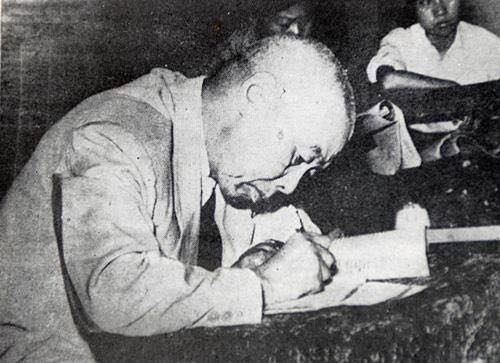Who’s Who of the Hutong? is a monthly feature that explores the lives of famous historical figures who lived in Beijing’s hutong. In this edition, we look at the life of Tian Han, the man who wrote the lyrics to the Chinese national anthem and who once lived in Xiguan Hutong.
A small and fairly run-down gray courtyard home lies in Xiguan Hutong, Dongcheng district. As far as hutong go, Xiguan is a far cry from more gentrified areas like Nanluoguxiang.
Nearby you’ll find the Beijing No. 5 Middle School, a bathhouse, convenience stores and a bar that looks like it’s seen better days.
Beside the entrance to a gray courtyard home is a small sign which reads ‘Ancestral Home of Tian Han’ alongside another sign which gives a brief description of his life. Such an unassuming location perhaps belies the importance of the man who lived in the courtyard home.

Tian Han's ancestral home in Xiguan Hutong. Image via Alistair Baker-Brian/That’s
Chinese author and playwright Tian Han was, in fact, the man behind the lyrics of ‘March of the Volunteers’ (Yiyongjun Jinxingqu), the national anthem of the People’s Republic of China. A supporter of revolutionary communism, his writing eventually fell foul of those close to Chairman Mao Zedong.

The sign reads 'Ancestral Home of Tian Han.' Image via Alistair Baker-Brian/That's
Born in Changsha county, Hunan in 1898, Tian Han’s support for communism was shaped by his early days studying in Japan from 1916 to 1922. It was there that Tian Han joined the Society of Chinese Youth in Japan, a group inspired by the anti-imperialist May Fourth Movement. He later joined the left-wing Dramatists League in 1930, and eventually the Communist Party of China in 1932.
His politics were reflected in his plays. Many pieces combined revolutionary communism with proletarianism and a smattering of feminism and patriotism.
Violin and Rose (Fan'elin yu qiangwei, 1920) tells the story of Liu Cui, a strong-willed folk singer who gives up her own dreams to finance her lover’s study of music in Paris. She hopes he can write “great music” for the poor workers to celebrate the founding of a youthful China.
The Devil of the Piano (Xue ya luo zhigui, 1922), portrays three music-loving sisters. They awaken to the class differences between those who can afford a piano and those like themselves, who work to produce the profits that enable rich families to purchase a piano.
However, his big break came as the screenwriter on the 1935 film Children of Troubled Times (Fengyun ernü), which tells the story of a group of poor performers fighting for the motherland. The play itself is not so much remembered, as one of the songs which accompanied it. The score was put together by a young composer named Nie Er, while the lyrics were written by Tian Han.
That song was none other than ‘March of the Volunteers,’ which would inspire Chinese resistance against Japanese occupation. Legend would have it that Tian came up with the words in jail, after being arrested in Shanghai by the Nationalists for his political activism; without any paper, he wrote the lines on the back of a cigarette packet.
The song became the provisional national anthem of the PRC in 1949 but wasn’t officially adopted until 1982. For such an outstanding contribution to the Chinese revolution, Tian Han was rewarded with the gray courtyard home in Xiguan Hutong in 1953.
He continued writing after the founding of the PRC in 1949. However, his works were not met with favor by many who were close to Chairman Mao. Like so many not deemed ‘revolutionary enough,’ Tian Han became a victim of China’s bloody Cultural Revolution. In 1966, he left his home in Xiguan Hutong for the last time as he was dragged away to be imprisoned. He died in 1968 following torture and maltreatment.
In 1979, as China’s Reform and Opening-Up era got underway, the collective memory of Tian Han was posthumously rehabilitated by the CPC. However, besides the two small signs on the wall indicating that Tian Han once lived there, his ancestral home in Beijing offers little for those who want to learn more about his life.
Instead, those who are interested in Tian Han should head to Changsha county, just outside Changsha city, capital of Hunan province. There, visitors can find his other ancestral home, which is open to the public, as well as the Tian Han Cultural Park. The Changsha Tian Han Grand Theater is also named after the city’s famous son.
Regardless of how Tian Han is remembered, his writing undoubtedly cemented his place in modern Chinese history.
READ MORE: 'Destination Peking' and Beijing's Original Hutong Hipsters
[Cover image via Xinhua]





















0 User Comments